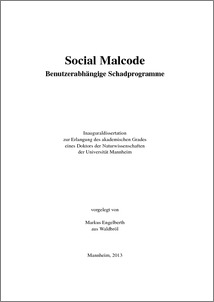|
Social Malcode : Benutzerabhängige Schadprogramme
Engelberth, Markus
![[img]](https://madoc.bib.uni-mannheim.de/style/images/fileicons/application_pdf.png)  Vorschau |
|
PDF (Dissertation - Markus Engelberth)
promotionsarbeit.pdf
- Veröffentlichte Version
Download (22MB)
|
|
URL:
|
https://ub-madoc.bib.uni-mannheim.de/34511
|
|
URN:
|
urn:nbn:de:bsz:180-madoc-345119
|
|
Dokumenttyp:
|
Dissertation
|
|
Erscheinungsjahr:
|
2013
|
|
Ort der Veröffentlichung:
|
Mannheim
|
|
Hochschule:
|
Universität Mannheim
|
|
Gutachter:
|
Freiling, Felix
|
|
Datum der mündl. Prüfung:
|
11 September 2013
|
|
Sprache der Veröffentlichung:
|
Deutsch
|
|
Einrichtung:
|
Fakultät für Wirtschaftsinformatik und Wirtschaftsmathematik > Praktische Informatik I (Freiling 2005-2010)
|
|
Fachgebiet:
|
004 Informatik
|
|
Normierte Schlagwörter (SWD):
|
Malware , E-mail , Social Engineering
|
|
Freie Schlagwörter (Englisch):
|
Malware , Social Engineering , E-mail , Worm Propagation , IT security
|
|
Abstract:
|
In den letzten Jahren ist ein Wandel bezüglich der Verbreitungsmethoden von Schadprogrammen, wie Viren, Würmern und Trojanern, zu verzeichnen. Während sich frühere Schadprogramme vermehrt voll automatisiert durch das Ausnutzen von Sicherheitslücken verbreiteten, rückt diese Methode der Verbreitung heutzutage aufgrund von immer sichereren Kommunikationsprotokollen und Betriebssystemen in den Hintergrund. Stattdessen nutzen Schadprogramme reguläre Kommunikationswege, wie z.B. E-Mails oder Instant Messaging Programme, für ihre Verbreitung. Die Autoren der Schadprogramme sind jedoch auf die Mithilfe ihrer Opfer angewiesen: Sie müssen diese durch Social Engineering dazu bewegen, beispielsweise den Anhang einer E-Mail auszuführen oder einem zugeschickten Verweis zu folgen, damit solch ein Schadprogramm den oder die Rechner eines Opfers infizieren kann.
Diese immer häufiger anzutreffende Art von Schadprogrammen haben wir Social Malcode genannt. In der vorliegenden Dissertation haben wir die Verbreitung solcher Schadprogramme näher untersucht. Neben einer formalen Definition von Social Malcode, haben wir deren Verbreitung simuliert und die Ergebnisse durch anschauliche Verbreitungsverläufe visualisiert. Die dafür notwendigen Simulationsparameter, die unter anderem das menschliche Verhalten von Computerbenutzern modellieren, haben wir durch umfangreiche Versuche und Skripte experimentell bestimmt. Zusammenfassend kann man festhalten, dass die Verbreitung von Social Malcode von wesentlich mehr Faktoren abhängt als die Verbreitung autonomer Schadprogrammen. So verbreitet sich Social Malcode beispielsweise aufgrund der Abhängigkeit von menschlichen Handlungen wesentlich langsamer.
|
|
Übersetzung des Abstracts:
|
A change in propagation methods of malware like viruses, worms, or trojan horses can be observed in the recent years. While early malware mainly propagated by exploiting vulnerabilities in a fully automated manner, nowadays this propagation method loses ground, due to more secure communication protocols and more secure operation systems. Instead todays malware uses regular communication channels, like email oder instant messaging applications, to infect new machines. This propagation method depends on some sort of user interaction: The authors of malware have to persuade their victims to, e. g., execute an email attachment or to follow a link – thereby the users’ machines will be infected with the malware. Often this user assistance is tried to be enforced by means of social engineering.
This more and more common sort of malware has been denoted by us as Social Malcode. In this work we have examined its propagation closely. Besides a formal definition of Social Malcode, we also have simulated its propagation and visualized the simulation results employing propagation graphs. We obtained the needed simulation parameters values, which among other things model the human behavior of computer users, by the use of extensive experiments and self written scripts. In summary, it can be stated that the propagation of Social Malcode depends on more factors than the propagation of autonomous spreading malware. Thus, Social Malcode spread much slower, for example, due to the dependence on human actions.
(Englisch)
|
 | Das Dokument wird vom Publikationsserver der Universitätsbibliothek Mannheim bereitgestellt. |
 Suche Autoren in Suche Autoren in
Sie haben einen Fehler gefunden? Teilen Sie uns Ihren Korrekturwunsch bitte hier mit: E-Mail
Actions (login required)
 |
Eintrag anzeigen |
|
|
